

Explore the various sections below to have a better understanding of why and how your teenage child strives to forge a sense of identity during adolescence.
Adolescence. Adolescent Development. What is adolescence?
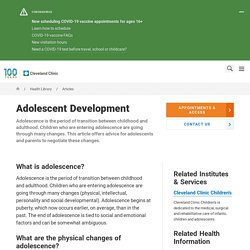
Adolescence is the period of transition between childhood and adulthood. Children who are entering adolescence are going through many changes (physical, intellectual, personality and social developmental). Adolescent Development. Overview During adolescence, young people experience many changes as they transition from childhood into young adulthood.
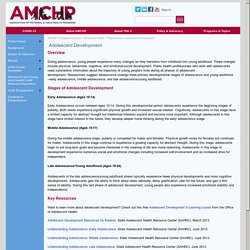
These changes include physical, behavioral, cognitive, and emotional-social development. Public health professionals who work with adolescents need substantive information about the trajectory of young people's lives during all phases of adolescent development. Researchers suggest adolescence undergo three primary developmental stages of adolescence and young adulthood --early adolescence, middle adolescence, and late adolescence/young adulthood.
Stages of Adolescent Development. Adolescent Identity Development - Adolescence - ACT for Youth. The development of a strong and stable sense of self is widely considered to be one of the central tasks of adolescence [1].
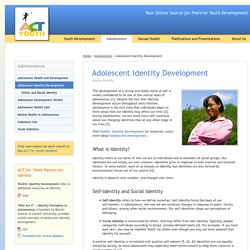
Despite the fact that identity development occurs throughout one's lifetime, adolescence is the first time that individuals begin to think about how our identity may affect our lives [2]. During adolescence, we are much more self-conscious about our changing identities than at any other stage in our lives [3]. Visit Toolkit: Identity Development for resources. Learn more about Adolescent Development.
What is Identity? The Different Stages That Make Up Erikson's Psychosocial Theory. Erik Erikson's Stages of Psychosocial Development. Erik Erikson was an ego psychologist who developed one of the most popular and influential theories of development. While his theory was impacted by psychoanalyst Sigmund Freud's work, Erikson's theory centered on psychosocial development rather than psychosexual development. The stages that make up his theory are as follows:1 Let's take a closer look at the background and different stages that make up Erikson's psychosocial theory.
Why Your Self-Identity is Important. In the previous article, “What Is Your Self-Identity,” we defined and got to the heart of what a person’s self-identity is.

In this article we are going to find out why knowing your self-identity is important. Knowing who we really are plays a key role in how we think, how we feel, and how we actually go about our day to day lives. Without knowing our personal identity we are much like a rudderless ship drifting aimlessly on the ocean, subject to the whims of the tides and winds. For this reason knowing our self-identity is important. Identity vs. Role Confusion. Identity vs. Role Confusion. Identity vs. Role Confusion in Erikson's Theory. Identity versus confusion is the fifth stage of ego according to psychologist Erik Erikson's theory of psychosocial development.
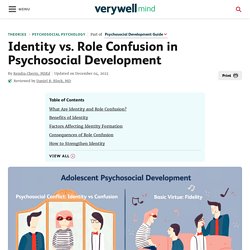
This stage occurs during adolescence between the ages of approximately 12 and 18. During this stage, adolescents explore their independence and develop a sense of self. According to Erikson, people progress through a series of stages as they grow and change throughout life. During each stage, people face a developmental conflict that must be resolved to successfully develop the primary virtue of that stage.
He was interested in how social interaction and relationships affect development and growth. Identity vs. role confusion stage. James Marcia's Ego Identity Statuses Explained. James Marcia and Self-Identity - Child Development Theory: Adolescence (12-24) James Marcia is another influential theorist who expanded upon Erikson's concept of identity crisis and identity confusion.

His initial work was published during the 1960's but his theory continues to be refined in accordance with recent research findings. Although Marcia's theory originally conceptualized identity development in terms of a progressive developmental trend, his theory has subsequently become more descriptive and categorical, defining and identifying particular configurations of identity exploration and commitment. Marcia's theory descriptively categorizes four main points or stations along the continuum of identity development. These stations or points describe very different identity conditions, ranging from a diffuse and indeterminate individual identity to a precisely defined and highly specific individual identity. Marcia used the term identity status to label and describe four unique developmental identity stations or points. Marcia's Identity Statuses.
Marcia's Four Identity Statuses. Parents Can Play An Active Role In The Identity Formation Of Their Adolescent Children. Mainstream belief regarding identity theory tends to portray adolescents as the sole agents involved in their identity development.
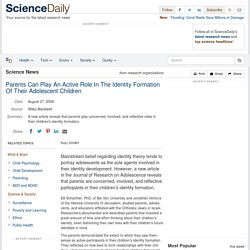
However, a new article in the Journal of Research on Adolescence reveals that parents are concerned, involved, and reflective participants in their children’s identity formation. Elli Schachter, PhD, of Bar Ilan University and Jonathan Ventura of the Hebrew University of Jerusalem, studied parents, adolescents, and educators affiliated with the Orthodox Jewry in Israel. Researchers documented and described parents that invested a great amount of time and effort thinking about their children’s identity, even fashioning their own lives with their children’s future identities in mind.
The parents demonstrated the extent to which they saw themselves as active participants in their children’s identity formation. Such thinking and planning can be very complex, taking into account broad socio-cultural factors, personal psychological dynamics, and ethical concerns. Understanding Your TeenagerThe Center for Parenting Education. In this 2nd part of the series, we explore the developmental growth of teens which can cause huge emotional and social changes during adolescence.
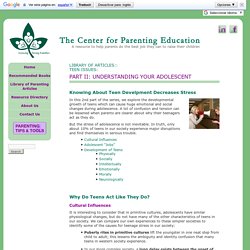
A lot of confusion and tension can be lessened when parents are clearer about why their teenagers act as they do. But the stress of adolescence is not inevitable. In truth, only about 10% of teens in our society experience major disruptions and find themselves in serious trouble. Cultural Influences It is interesting to consider that in primitive cultures, adolescents have similar physiological changes, but do not have many of the other characteristics of teens in our society. Six Ways to Build Your Teen's Identity - Focus on the Family. Marriages and families are in trouble after the challenges of last year.

If it's not too much to ask, would you help equip these families with the resources they need to put Jesus at the center of their home? Yes, I will help struggling families! Español Helping Families Thrive™ 7 Tips to Help Your Teen Create a Strong Sense of Self. 7 Tips for Parent’s to Help Their Teen Create a Strong Sense of Self As we welcome in the New Year we also look at goals and new opportunities to explore in the coming year.

A fresh start. As parents, it might be a great time to reflect on how you are supporting your kids in building a stronger sense of self. Sometimes as parents we can get a bit over excited about what our kids could have interests in— wouldn’t it be great if they just popped out with all of our passions and wanted to do them with us from day one?! But as you probably have found this is not usually the case. References.